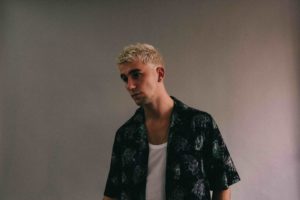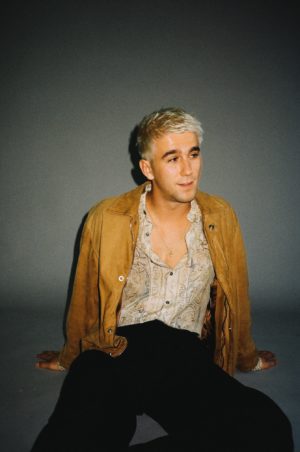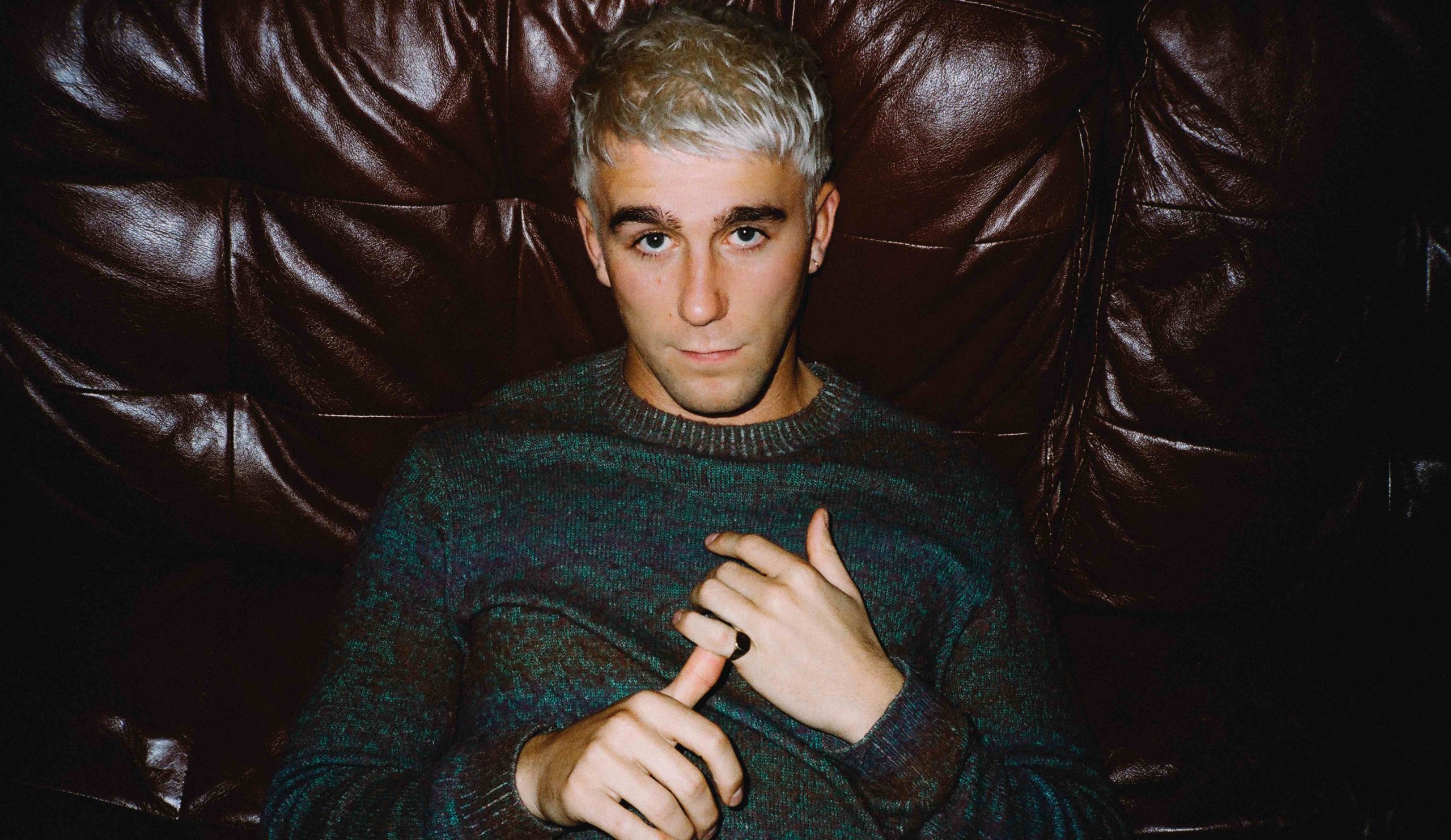Since he first learned to produce music in his parents’ attic as a teenager, SG Lewis’ career goal has been to perform at the O2 Academy Brixton, a historic London venue with a capacity of nearly five thousand. The UK-based musician had a show scheduled there for February 1, 2020, just as the eighteen-month promotional run for his previous project, Dusk, Dark, Dawn, was coming to a close, but he’d already begun work on what would become his first full-length album, times. Worried that the monumental show would seem like more of a “victory lap” than a celebration of his hard work, he decided to postpone it. Of course, he had no clue that six weeks later the pandemic would shut down concert venues for the foreseeable future.
“I delayed it because I wanted to bring the audience into this new world and this new music,” the artist born Samuel George Lewis says of the show, which was rescheduled for September 2020 before getting postponed yet again. “I think it will happen eventually, hopefully, fingers crossed… But the idea of five thousand people packed in with sweat rising off the crowd feels like a long way away right now.”
Lewis has always been inspired by nightlife, but its ongoing absence is especially burdensome as times is the first project he’s created specifically to be heard on the dancefloor. Discovering his love for dance music at a young age, it wasn’t until he first entered a club as a late teen that he discovered an entire culture connected to the genre, which he instantly formed a deep connection with. “A lot of people think that club culture is a hedonistic thing that people do on the weekends, or to pass the time,” says the 26-year-old musician. “But when I look back at my experiences, so many of my favorite memories with my friends, my family, or people that I love are attached to experiencing music in a club or at a festival.”
Describing his time spent in clubs as “life-affirming,” it’s no wonder his love for them runs throughout his entire discography, including Dusk, Dark, Dawn, a three-part project that chronicled the beginning, middle, and end of a night out. For the disco-influenced times, Lewis set out to go beyond his own experiences and dive into the history behind the dance music that inspires him. He had collected disco records as a hobby for years, but he became obsessed with the genre about two years ago when a friend recommended him Tim Lawrence’s Love Saves the Day, a book that recalls the story of disco’s birth in 1970s New York City.
“It talks about The Loft, and David Mancuso, and Paradise Garage, and I just became fascinated with the era—not necessarily because of the stylistic qualities or the aesthetic, but rather what the music represented for people at the time,” details Lewis. “It was the soundtrack to these inclusive, safe spaces for marginalized communities to be able to celebrate being themselves, and I think that was such an amazing purpose for a type of club music.”
“A lot of people think that club culture is a hedonistic thing that people do on the weekends, or to pass the time. But when I look back at my experiences, so many of my favorite memories with my friends, my family, or people that I love are attached to experiencing music in a club or at a festival.”
His interest in disco’s origins sparked the creation of times, a stunning set of ten funky, synth-laced tracks complete with four-on-the-floor drums and Lewis’ inspired sparkly touch. Conscious of his own identity as a straight white man, while making the record he strived to pay tribute to the Black and queer communities and notable figures who initially brought disco to mainstream prominence. “I had to know that I was doing my research,” he says. “And then paying my dues and making sure I’m pointing people back in a direction of where the music’s come from rather than being like, ‘Hey, I’m the inventor of this style.’”
His efforts are heard throughout times, which opens with a clip from an interview with audio engineer Alex Rosner, known for designing the first stereo DJ mixer and handling sound design in many iconic NYC nightclubs in the ’70s. “There was harmony in the music / There was harmony in the behavior of the people / And we had a good time,” Rosner says in the clip, a simple thesis on disco’s initial reign. Lewis also recruited some fitting collaborators for the album: R&B/funk singer Lucky Daye, hip-house musician Channel Tres, dance pop auteur (and gay icon) Robyn, as well as disco legend Nile Rodgers. A major feat for his debut album, Lewis scored the features thanks to the clout he’s built from recent high-profile production work, including Victoria Monét and Khalid’s ultra-dreamy “Experience” and his friend Dua Lipa’s psychedelic house banger “Hallucinate.”

“It’s affirming to have those legends be up for collaborating and being a part of it. I feel super humbled, and it makes me feel like anything is possible collaboration-wise,” Lewis says. “A lot of people get to dream up records, but now I get to actually go and make them with people who I’m hugely inspired by, so it makes this whole ‘making music’ thing really exciting.”
Lewis may be soaring atop of his game, but he hasn’t forgotten his own musical origins. When he was sent into quarantine midway through his work on times, he chose to head back into his parents’ attic to finish it. Additionally, another artist featured is his longtime collaborator and friend, British singer/songwriter Frances, aka Sophie Cooke. A co-writer on “Hallucinate” among other Lewis-produced tracks, she lent her vocals to his debut single “Warm” in 2015—but due to his low profile, her record label asked him to pitch them down to an unrecognizable frequency. (“I’d never released music, and they were like, ‘Who are you?’”) Fast forward to today, she’s officially credited as a feature on the vibrant “Heartbreak on the Dancefloor.”
“I listen to [‘Warm,’] and I’m like, ‘Oh, this is clearly Sophie pitched down,’ but I’d never even thought about the possibility that anyone would hear it and be like, ‘Oh my God, whose voice is that?’” He says, “So for me, having Sophie on the record is a very full circle [moment] of now allowing fans to join the dots back to those records if they haven’t already.”
“A lot of people get to dream up records, but now I get to actually go and make them with people who I’m hugely inspired by, so it makes this whole ‘making music’ thing really exciting.”
After crafting an album dedicated to nightlife that represents his artistic growth to date, Lewis was hoping to play it at his favorite parties and clubs, from Rhonda in Los Angeles to Brooklyn’s House of Yes. Those shows will have to wait until safer times, though a break in London’s lockdowns did allow him to play a recent socially distanced show at Night Tales in Hackney. Audience members had to remain at their tables in groups of six—a far cry from the packed clubs of his dreams, but it was surprisingly more fulfilling than he initially expected. “It was a real reminder that it’s a human requirement,” he says. “You put a group of people together, and you play some music, and people need to dance.”
Until nightlife returns, Lewis plans to do anything but sit idly by. He’ll be performing a live stream concert on the day of times’ release, and he’s already hard at work on pop records for other artists as well as his own next album. His eventual O2 Academy Brixton show will still be a major milestone, but Lewis’ main goal now is to be viewed as a jack-of-all-trades musician—a la his idol, Pharrell—whose presence is felt throughout the entire pop music landscape.
“I want people to love my music as an artist, and I want people to look at the credits of some of their favorite records and be like, ‘Oh, he’s involved there!’” He explains, “In ten years time, I’d like to look back and be like, ‘Yeah, I really made a dent.’” FL










